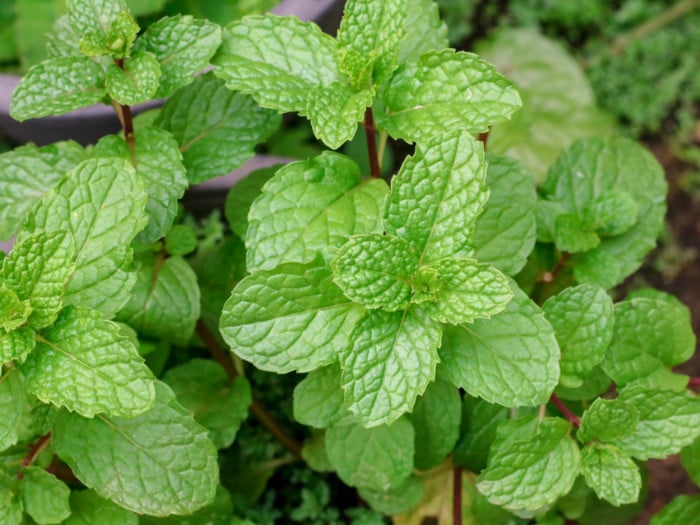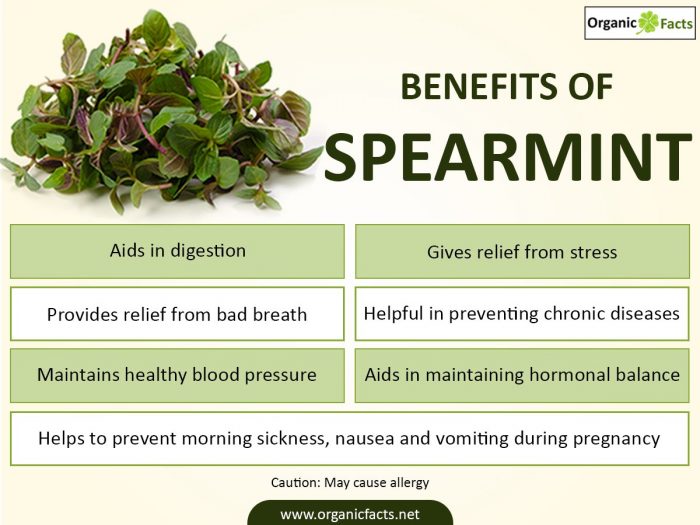The most important health benefits of spearmint include its ability to improve digestion, boost respiratory health, optimize hormonal levels, relieve stress, increase circulation, maximize heart health, and protect and strengthen the immune system.
What is Spearmint?
Spearmint is a herbaceous perennial plant with a square-shaped stem, broad leaves, and white/pink flowers. The leaves are where the value lies, at least in terms of use, as they contain many of the active ingredients and a high concentration of the scent and flavor. [1]
Spearmint, which has the scientific distinction as Mentha spicata, is a word that most people recognize, but often as the flavor of their favorite chewing gum. However, there is far more to this species of mint, which is why it has received so much attention in recent years. This type of mint is actually native to Europe and Asia, but has spread throughout the rest of the world in recent centuries and has now been naturalized on five continents.
Spearmint has a wide range of applications, including its culinary uses to flavor cocktails, sauces, dips, entire dishes, or even as a garnish, in addition to hygiene products, toothpaste, mouthwashes, soaps, and body scrubs. Spearmint tea and its essential oil are perhaps the most direct and beneficial, aside from chewing the leaves directly. [2]

Spearmint leaves are ideal for good breath. Photo Credit: Shutterstock
Serving Size : Nutrient Value Water [g] 85.55 Energy 44 Energy [kJ] 184 Protein [g] 3.29 Total lipid (fat) [g] 0.73 Ash [g] 2.03 Carbohydrate, by difference [g] 8.41 Fiber, total dietary [g] 6.8 Calcium, Ca [mg] 199 Iron, Fe [mg] 11.87 Magnesium, Mg [mg] 63 Phosphorus, P [mg] 60 Potassium, K [mg] 458 Sodium, Na [mg] 30 Zinc, Zn [mg] 1.09 Copper, Cu [mg] 0.24 Manganese, Mn [mg] 1.12 Vitamin C, total ascorbic acid [mg] 13.3 Thiamin [mg] 0.08 Riboflavin [mg] 0.18 Niacin [mg] 0.95 Pantothenic acid [mg] 0.25 Vitamin B-6 [mg] 0.16 Folate, total [µg] 105 Folate, food [µg] 105 Folate, DFE [µg] 105 Vitamin A, RAE [µg] 203 Vitamin A, IU [IU] 4054 Fatty acids, total saturated [g] 0.19 14:0 [g] 0 16:0 [g] 0.14 18:0 [g] 0.02 Fatty acids, total monounsaturated [g] 0.03 16:1 [g] 0 18:1 [g] 0.02 Fatty acids, total polyunsaturated [g] 0.39 18:2 [g] 0.05 18:3 [g] 0.34 Phytosterols [mg] 10 Tryptophan [g] 0.05 Threonine [g] 0.14 Isoleucine [g] 0.14 Leucine [g] 0.25 Lysine [g] 0.14 Methionine [g] 0.05 Cystine [g] 0.04 Phenylalanine [g] 0.17 Tyrosine [g] 0.1 Valine [g] 0.16 Arginine [g] 0.15 Histidine [g] 0.07 Alanine [g] 0.17 Aspartic acid [g] 0.39 Glutamic acid [g] 0.36 Glycine [g] 0.16 Proline [g] 0.14 Serine [g] 0.13 Sources include : USDA [3]
Health Benefits of Spearmint
The medicinal benefits of spearmint are particularly impressive, many of which can be enjoyed in any form. Let’s take a closer look at the health benefits of this powerful variety of mint.
Antibacterial Property
The most common association of spearmint is with fresh breath, but its role in mouthwashes and toothpaste is not solely to keep your breath smelling good. The natural antibacterial and antimicrobial nature of organic compounds in it help protect your mouth and throat from infections, including those that can damage dental and gum health. Bad breath is actually called halitosis, which is caused by bacteria below the gums, so spearmint keeps you healthy and smelling great. [4]
Respiratory Health
Spearmint tea has a significant impact on the health of your respiratory system due to its naturally soothing and anti-inflammatory qualities. It can help relieve sore throats and tightness in the chest, alleviating congestion and irritation. According to experts, spearmint’s powerful aroma can also help clear up sinuses and even increase mental clarity.
Aids in Digestion
Spearmint has a number of roles to play in the digestive system, particularly as a gentle tonic to ease an upset stomach. The secret ingredient in this mint is (-)-carvone, which helps in reducing muscle contractions in the digestive tract. [5]
It is popular during pregnancy to prevent morning sickness, nausea, and vomiting, but can also be used by others suffering from such gastrointestinal issues as excess flatulence, cramping, or bloating. IBS (Irritable Bowel Syndrome) seems to be increasing in recent years, and spearmint tea or chewing directly on spearmint leaves is often recommended to treat or manage the condition more effectively. [6]
Hormonal Balance
For those suffering from polycystic ovary syndrome or some other form of hormonal imbalance, spearmint has been shown to treat the condition. The powerful organic compounds in spearmint can inhibit and stimulate the endocrine system in different ways, helping optimize your hormonal balance and preventing the complicated metabolic side effects, including hirsutism, by reducing excessive testosterone levels in females. [7]
Improves Circulation
The iron content in a single serving of spearmint is more than 100% of the daily recommended amount, which can stimulate the production of red blood cells and hemoglobin. This not only prevents anemia but also increases circulation to the body’s extremities, boosting energy levels and wound healing. [8]
Heart Health
The high potassium levels found in spearmint are crucial to maintaining healthy blood pressure; potassium is a vasodilator, meaning that it relieves the stress on blood vessels and arteries, therefore helping prevent atherosclerosis, strokes, and heart attacks. [9]

Spearmint infographic Photo Credit: Shutterstock
Stress Relief
Menthol, one of the most powerful active ingredients in spearmint, has a soothing and sedative effect on the body. It has been known to help you get into a calm and relaxed state. If you suffer from chronic stress or anxiety, a cup of spearmint tea can help ease your mind and eliminate the negative effects of chronic stress hormones in your body’s systems. [10] [11]
Antioxidant Properties
The other chemical compounds found in spearmint include limonene, cineole, pinene, vitamin A, vitamin C, riboflavin, and thiamin. The combination of these antioxidant compounds with metabolism-balancing substances makes mint a powerful tool to prevent chronic diseases, many of which are caused by free radicals attacking healthy cells. Antioxidants neutralize these free radicals and eliminate them from the body. [12]
How to Use Spearmint
Fresh spearmint leaves are low on menthol as compared to other mint species, which makes it less pungent. You can include it in many ways in your diet, some of which are listed below.
- Salad: Sprinkle some leaves on your salads for a minty flavor.
- Smoothie: Blend a couple of spearmint leaves into your fruit or vegetable smoothie.
- Yogurt: You can add mint leaves to your berry-topped yogurt.
- Beverage: Add 2-3 spearmint leaves to your lemonade for a cool twist.
- Tea: Fresh leaves can also be used to make tea. All you have to do is boil a cup of water and add spearmint leaves to it. Steep for five minutes and your tea is ready.
Word of Caution: Some people are highly sensitive to mint and may experience allergic reactions while touching or consuming the herb. These reactions are usually mild (skin rash, throat irritation, headache, or dizziness) but it is still best to avoid this herb if you do suffer from the allergy and find other natural remedies for your health concerns.
